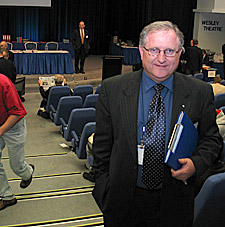 Sydney Synod has voted to ensure safety in ministry by approving new, simpler policies in dealing with complaints of sex abuse and misconduct.
Sydney Synod has voted to ensure safety in ministry by approving new, simpler policies in dealing with complaints of sex abuse and misconduct.
Last night the Synod agreed to a number of new measures that include making it an offence for people in a position of leadership at church, such as Sunday school teachers and wardens, to fail to report suspicious behaviour and known sex offenders.
Child sex abuse and misconduct by clergy and church workers has also been made a specific offence.
There will be a significant reform with how allegations of "wrongful moral conduct' are handled, with one set of enforceable standards for both clergy and lay people.
The ordinance also proposes to set up a Professional Standards Committee to consider complaints at an early stage.
This is with a view to working out what is the best way to deal with the complaint rather than the matter by default often going before a tribunal.
Sydney Diocese's Director of Professional Standards, Philip Gerber, told the Synod the legislation is "a consolidation, rationalisation and simplification of all the discipline procedures both in relation to clergy and lay people'.
"This Ordinance sets up a comprehensive and coherent procedure for receiving, documenting, investigating, considering and dealing with allegations of misconduct against members of the clergy and church workers," he says.
"It provides for a wide range of options in terms of how an allegation will be dealt with."
Mr Gerber says both those alleging abuse or misconduct and those about whom the complaint is made need to feel they are dealt with fully and appropriately and with justice and fairness.
"Most importantly, the Ordinance seeks to ensure that so far as is humanly possible (under God), all vulnerable people to whom the Church ministers (especially children), are protected and safe so that the great news of God's grace in Jesus" will not be compromised,” Mr Gerber says.
He told Sydneyanglicans.net that he is pleased that the Synod has voted for the policy change for discipline matters.
"We're hoping we won't have to bring another one back for another ten to twenty years.”
The disciplinary procedure for dealing with complaints is one part of the four pronged approach to ensuring safety in ministry.
The other three pre-emptive strategies are carefully selecting and screening all clergy and church workers, providing clear direction as to what is expected of clergy and church workers and training and supporting clergy and church workers in their role.
Church continuing to ensure it is child-friendly
The church has always had disciplinary procedures for members of the clergy, but in 1996 a regime of discipline was brought in for lay church workers, which was again refined in 2002.
Mr Gerber told the Synod that the present focus on discipline for clergy and church workers has stemmed from the church's response to "the tumultuous circumstances of Wood Royal Commission, Paedophilia reference" the Hollingworth controversy and the lessons learnt from enquiries into the handling of clergy child abuse and misconduct allegations in Adelaide, Brisbane, Sydney, Tasmania and other places'.
The Discipline Ordinance was first presented to last year's Synod and received submissions throughout the year.
There was wide consultation with Synod members and regional councils.
In 2004 the national church parliament, the General Synod, recommended that all of Australia's 23 dioceses adopt legislation for professional standards to protect against sex abuse and misconduct.
This is gradually being adopted across the Australian church, with Sydney Diocese being the first to adopt the legislation.






















